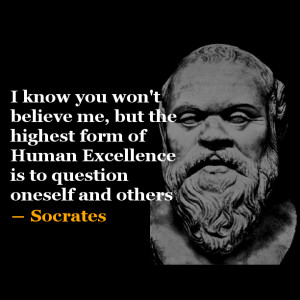
Thinking: Both Conscious & Critical
"I think therefore I am"
is not just a great phrase. In it, lies the truth about human existence. To think is to exist. And to not think is not possible as long as one is alive i.e., existing.
So, when exactly are we thinking?
Everyone thinks, all the time.
Conscious Thinking vs Auto-pilot Thinking
As Paul Rulkens mentions in his TEDx Talk at Maastricht, "The purpose of all thinking is not to think."; And anyone familiar with meditation knows what he means. Bu here, thinking is of two kinds.- In the normal state of the mind, the incessant and turbulent flow of all kinds of random thoughts called "Auto-pilot Thinking".
- In the focused state of the mind, when one actually thinks about a particular object, or what I like to call "Conscious Thinking".
Okay, so most of the time our minds are on Auto-pilot. But when we think about a particular thing (object), we become conscious of our thinking process and can then focus (for the most part :P) on that thing.
What is Critical Thinking?
Consider this example: Till 1543 AD, almost everyone on earth thought that the earth was at the centre of the solar system and the universe. Until Nicolaus Copernicus published his books and removed earth from the center, in 1543 AD. Even after that, most people didn't believe his theories because the Roman Catholic Church considered them heretical (against their religion). So it was believed as a fact, just by a few people who had heard/read about it; instead of becoming a commonly known fact, which happened decades, if not more than a century, later.
In this example, Copernicus didn't believe what everyone else thought to be true. He thought in a critical and innovative way and ended up revolutionising our knowledge about the universe.
Whereas, a majority of the people didn't think critically and blindly, unquestioningly believed in other people's beliefs and missed out on understanding the universe, in a critical manner and seeing it for what it actually was. Maybe, one of them could've discovered gravity, decades before Isaac Newton!
In this example, Copernicus didn't believe what everyone else thought to be true. He thought in a critical and innovative way and ended up revolutionising our knowledge about the universe.
Whereas, a majority of the people didn't think critically and blindly, unquestioningly believed in other people's beliefs and missed out on understanding the universe, in a critical manner and seeing it for what it actually was. Maybe, one of them could've discovered gravity, decades before Isaac Newton!



No comments:
Post a Comment